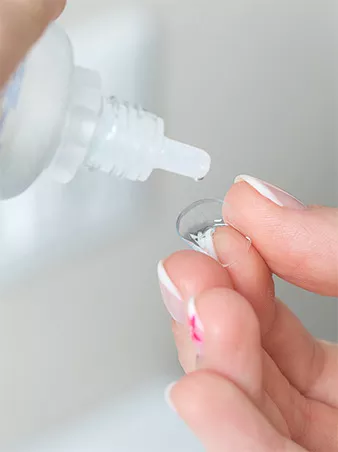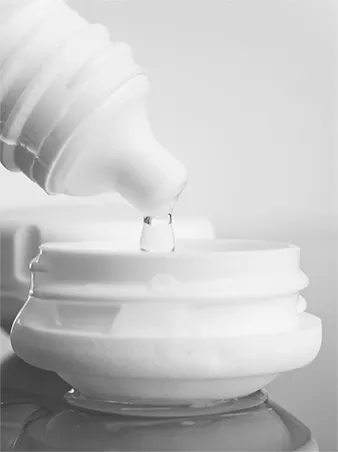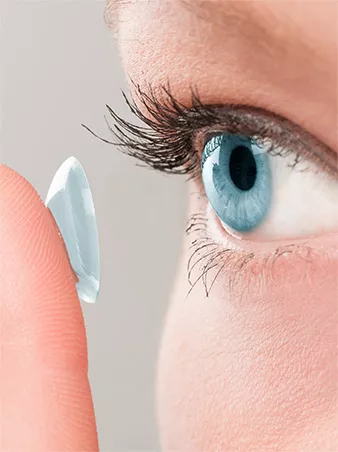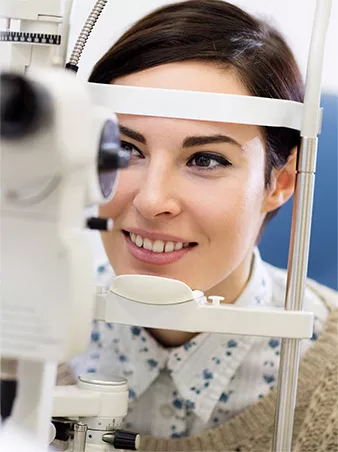Contact lenses provide vision correction, among other benefits. For perspective, these optical add-ons move with your eyes, they don’t fog up or partially obstruct your vision like glasses do, and they’re great for physical activities.
Although contact lenses are a safe alternative to glasses, users must stay up-to-date on contact lens care practices, like cleaning contact lenses to prevent eye infections. Whether you’re using cheap or top-of-the-line contact lenses, it’s essential to pay close attention to your optical health at all times.
According to the American Optometric Association, the following are lead causes of lens infections:
- Use of extended-wear lenses
- Reduced tear exchange under the lens
- Environmental factors
- Poor hygiene
With this in view, we’ve outlined the best tips and practices for your lenses and general eye care principles to help decrease the chances of infection
How to Clean Your Contact Lenses?

Learning how to clean contacts is the first step in proper hygiene. Following these tips will effectively reduce the risk of bacteria build-up and infection when cleaning your contact lenses.
Before handling contact lenses, ensure to wash your hands thoroughly with soap and water. Afterward, use a lint-free towel to dry your hands.
That said, let’s look at some ways you can clean your contacts as efficiently as possible:
The “rub and rinse” contact cleaning technique can be helpful even if you have a “no-rub” variety of solutions. Here, all you need to do is employ these steps:
- Step One: Rub your contact lenses with your fingers
- Step Two: Rinse the lenses with the solution before soaking them
Keep Away from Saliva
Many people believe they can use saliva and the palm of their hands to clean their lenses. However, this isn’t proper in the slightest. Also, using anything besides a sterile solution to clean your lenses can be uncomfortable and dangerous.
Regardless, there’s a solution. If you’re looking for lenses that may lower your chances of infection, or if you don’t use lenses regularly, experts recommend single-use daily disposable lenses. That said, you’ll still need to follow specific steps crucial for good eye health. Thus, be sure to consult your ophthalmologist for the perfect pair.
Can You Clean or Put Contacts in Water?

This query is quite popular amongst contact wearers. However, cleaning your contacts in water is not proper to sterilize your lenses.
Why?
Irrespective of its sparkle, water may contain bacteria and other microbes that are harmful to your eyes. Acanthamoeba keratitis, a naturally occurring parasite in water, can seep through the contact lenses to your eyes, causing severe vision problems.
Therefore, you must use a new contact solution to ensure your lenses’ thorough and safe cleaning.
How to Take Off Your Contacts Safely

Mastering the art of taking off contacts is crucial on all fronts. Removing your contacts unsafely can lead to complications like eye infections or a damaged cornea. Thus, you may need some days to practice wearing and removal.
If you’d like to take out your contacts safely, apply these steps:
- Ensure your hands are clean and dry. Then, look up carefully and pull down your lower eyelid with your middle finger.
- Now, using your index finger, gently touch the lower edge of the lens and slide it down to the lower white part of your eye.
- Squeeze the contacts between your thumb and index finger to ensure safe removal. Now, you can remove the lens without hassles.
- Repeat this procedure for your other eye.
Solution for Your Contacts: Best Practices to Adopt
While it’s crucial to know how to properly wash your lenses, adopting proper care practices for your contact solutions is non-negotiable. Here are some tips we recommend:
Use a Fresh Solution
Don’t be tempted to reuse an old cleaning solution for your contact lenses. When they expire, their sterilization prowess depreciates significantly.
Keep Your Solution in Its Proper Container
Transferring solutions for contacts into new containers can affect its sterility. So, ensure you buy a travel-sized contact lens cleaner if you plan on traveling with your contacts.
Keep the Tip of the Bottle Sterile
Don’t allow the tip to touch any surface. Keeping your contact lens cleaner helps to prevent bacteria build-up and infections.
How to Store Contact Lens Without Solution: Is It Possible?
It’s best to store your lenses in a contact lens solution. If you’ve run out of contact lens solutions and need to keep your lenses regardless, you might want to set your sights on options like distilled water, saline solution, or saltwater.
Although saline solution ranks as the safest of the three, you should only use it when there’s no alternative. Distilled water is also safe but still poses a slight risk of infection. Saltwater carries a higher risk of disease than the others and should only come in as a last resort.
Other Contact Lens Care Tips
Besides the essential tips we’ve listed, you can adopt these practices to ensure your contact lens hygiene remains stellar at all times:
Minimize Contact With Water
To avoid mishaps and infections, remove your lenses before swimming, using a hot tub, or taking a shower.
Stay on Schedule When Replacing Lenses
Using lenses beyond their expiration date is dangerous. To avoid bacterial build-up and contamination, replace your lenses before their expiry timelines.
Follow Specific Lens Cleaning and Storage Guidelines
Pay close attention to any guidelines from your eye care professional and any instructions from the contact or solution manufacturer.
Keep Your Eye Contact Case Clean
Rinse your eye contact case with a new solution. Endeavor not to rinse your case with water. Instead, open your empty case and leave it to dry. That said, we recommend that you replace them when they’re damaged.
Pay Special Attention to Disinfecting When Storing Lenses for Long Periods
Instructions may be provided by your lenses or solution manufacturer if you intend to store your lenses for an extended period. Under no condition should you wear lenses stored for 30 or more days without re-disinfecting.
General Eye Care for Contact Wearers
While caring correctly for your lenses and solution is critical, you’ll need to consider your total eye health. Therefore, follow these tips on proper eye care for contact wearers:
Know When to Consult an Ophthalmologist
- Redness
- Eye irritation
- Pain
- Tearing
- Increased light sensitivity
- Blurry vision
- Discharge
- Swelling
Getting a hold of these issues on time is vital to prevent further deterioration.
Stop Smoking
Smokers who wear contacts are more likely to develop eye diseases than non-smokers.
Get Regular Eye Exams

If you wear contacts, visiting your healthcare provider annually is essential. Remember, contacts and prescriptions expire, so it’s best to see an eye doctor yearly for perspective on looming infections.
However, if a visit isn’t achievable, taking care of your lenses, solution, and eye care in general, is essential to keep bacteria build-up at bay.
Contact Lens Care for Daily, Bi-Weekly, and Monthly Contacts
Contact lenses are safe, but if you wear them too long or don’t adhere to proper lens care, they can damage or hurt your eyes. Thus, it’s best to follow your eye care provider’s instructions at all times.
Different types of contact lenses have timelines for how long you wear them safely. For instance, bi-weekly contact lenses aid two weeks of “non-continuous” wear. For context, non-continuous means that you need to take off your contacts every night. On the other hand, monthly contact lenses are generally suitable for one month of non-continuous wear.
Depending on your optical needs, your eye care provider will help you identify the most suitable contact lens variation (schedule and replacement inclusive) for your eye health and your lifestyle.How Can You Take Care of Daily Disposable Contact Lenses?
Daily contacts are for one-off use only. When you wear a fresh pair in the morning, ensure to dispose of it at night. Why? These contacts are thinner and do not hold up beyond their indicated use.
While you do not need a contact lens solution or a case for daily disposable lenses, it is a good idea to have both. You can use them when you’d like to remove your daily contacts for short periods, like when you want to take a shower or a few minutes to nap.
Although there’s no need to worry about cleaning daily disposable contacts, ensure that you follow these contact care recommendations each time you put them on or take them out:- Thoroughly wash your hands with soap (we recommend oil-free, lotion-free, perfume-free soap)
- Dry your hands with a lint-free towel before handling your contact lenses
- While handling contact lenses, keep your fingernails away
- Insert your contact lenses before you put on makeup or use a hairspray
- If you experience dry eyes from wearing contacts, ensure to engage the appropriate rewetting drops attached to that model
How to Take Care of Bi-weekly Disposable Contact Lenses?
Bi-weekly disposable contact lenses (also called 1-2 weekly contacts) come in boxes that hold 6, 12, or 24 contact lenses. While a single package with 24 lenses is more expensive, it is cost-effective in the long run.
If it’s your first time wearing contact lenses or if you are transitioning from daily contacts to bi-weekly contacts, remember these tips:
- Please wash your hands thoroughly and dry them with a lint-free towel before handling contacts
- Always take your lenses off each night. Once you’ve done, this ensure you clean the lenses thoroughly and have them stored in a contact case overnight
- Do not reuse any amount of contact solution (remember, a 100% fresh unexpired solution is vital)
- If your doctor prescribes extended wear, don’t wear 1-2 weekly contacts beyond six nights or seven days
- Never use water or saliva to clean or store your contact lenses
- Always check the expiration date on the lens blister. Don’t use contact lenses if they are expired (the same goes for your solution)
- Follow your eye care provider’s recommendations for wear and replacement
That said, it’s also crucial to implement these extensive practices:
When your eyes get irritated during the day, it’s helpful to have on-hand eyeglasses or another pair of contacts. Doing this is a must, especially if you expect to be in an air-conditioned room or dusty environment. To avoid being caught unexpectedly, it’s crucial to carry contact lens solution and rewetting drops.
Secondly, do not take naps in your contacts, as this may significantly decrease the amount of oxygen that your eye gets. Also, the lens itself can deform while you sleep, increasing the risk of an eye infection, inflammation or abrasions. Therefore, you must always dispose of your contacts if they get deformed (don’t reuse dried-out contacts either).
If your eyes feel dry and more tired in the evening, take off your contacts when you get home and wear your eyeglasses until bedtime. This action gives your eyes a little more rest time and makes it less hurtful.
How do you care for monthly contacts?
Monthly contacts are soft contact lenses designed for 30-day wear, and they usually come in a pack of 6 or 12 lenses. At WebEyeCare, there are tons of popular monthly contact brands, all featuring the lowest possible prices.
Wearing monthly contacts is a popular choice as it offers convenience. Additionally, if you wear contacts regularly, you’ll find them more affordable than purchasing newspaper dailies.
That said, here’s what you need to know when wearing monthly contact lenses:
- Follow your eye care provider’s instructions and wear schedule
- Don’t sleep in your monthly contacts (unless an eye care expert prescribes extended-wear lenses)
- Discard them 30 days after you open the blister
- To ensure you don’t miss the expiry date, set a reminder
- Follow the restrictions for how many hours you can wear your monthly contacts (check with your eye care professional)
- Always wash your hands with soap and dry them with a lint-free towel before handling contacts
If you’ve worn your monthly contacts for only a few days and it has been over a month since the first day, it is safe to toss them away.
Traveling With Contact Lenses
If you are a contact wearer, then traveling and packing for a trip should see you adopt these preventive measures:
- Always bring backup eyeglasses and ensure they’re of the latest prescription
- Don’t forget rewetting drops for your contacts (if you are flying, this is a must as the cabin air is air-conditioned and dry)
- Bring an unexpired solution and a contact case. While a travel-size solution will allow you to keep the solution on board with you if you are flying, it is also a good size to keep in your purse or backpack.
- Bring enough contact lenses for the whole length of your travel + 1 extra pair for unforeseen scenarios
- Save a copy of your contact lens prescription on your phone
Having a copy of your contact lens prescription is vital if you run out of your contacts and need to order another pair. Thus, check the date on your prescription and visit your eye care professional for renewal if needs be before your travel.
Frequently Asked Questions
It would be best if you did not put your contact lenses in water unless it’s a last resort. Putting contacts in water gives room for bacteria and microbe build-up on your lenses, and these organisms getting into your eyes can cause severe eye problems.
Taking a shower with your contact lenses isn’t advisable as your contact lenses can absorb water-containing eye-damaging microbes.
Prescription-colored contacts are safe. However, your eye care specialist will need to examine your eyes to ensure they are a good fit for contact lenses. Once proven ideal, you can wear colored contact lenses even if you don’t need vision correction.
If you have sensitive eyes, your optometrist may recommend gas permeable (GP) or hydrogel lenses. GP lenses are smaller and do not absorb moisture from your eyes. On the flip side, a soft contact lens made from hydrogel material has a unique biocompatibility with the eye, making them the ideal fit for sensitive or dry eyes.
If you’ve run out of solution for your contacts, you can store your lenses overnight in saline or distilled water. Unlike multipurpose solutions, these alternatives do not clean or disinfect your contacts. They carry a little infection risk, and should only be used in emergencies.
Subscribe to our Newsletters

 Save yourself from getting into rush hours and buy your contacts online.
Save yourself from getting into rush hours and buy your contacts online.







